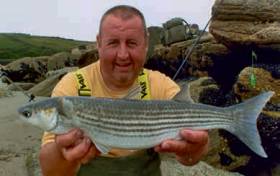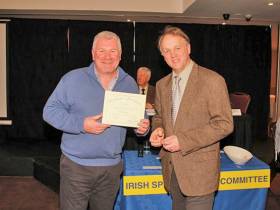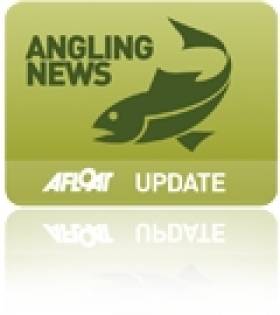Displaying items by tag: ISFC
Record-Smashing Golden Grey Mullet Landed In Cork
#Angling - Dublin angler Ian Mulligan has broken the golden grey mullet record, which was established as recently as 2014.
The new record, weighing 1.29 kg, was caught at Rosscarbery, Co Cork on 4 July 2017 and was recently ratified by the Irish Specimen Fish Committee (ISFC), which has just published its annual report for 2017.
The ISFC, which is supported by Inland Fisheries Ireland, is an independent voluntary body which verifies and records the capture of large fish caught on rod by anglers in freshwater and marine waters.
As well as the new record, detailed information on 422 specimen fish (large fish) taken by anglers from venues throughout Ireland in 2017, comprising many different species, is detailed in the report.
The main species were smaller shark species like smooth hound and spurdog and carp, the latter of which dominated freshwater. All fish were caught, weighed, measured and released.
The Irish Specimen Fish Committee Report 2017 is available to download HERE. Hard copies of the report are available from Inland Fisheries Ireland offices nationally.
Meanwhile, the ISFC Awards Day, when anglers will be presented with their awards and certificates, will be held on Saturday 17 February in conjunction with the Irish Angling Show in Dublin.
Specimen Fish Awards Kick Off 2016 Angling Season
#Angling - The number of successful young anglers collecting their specimen award certificates was the highlight of the Irish Specimen Fish Committee’s Awards Day on Friday 20 February.
Held in Dublin on the same weekend as the Ireland Angling Show 2016, both events were attended by large numbers of anglers from all over the country and abroad – such as Dutch angler Henk Thuelings, who travelled from the Netherlands to collect his specimen award for a large tope taken off Wicklow.
Record fish and specimen awards were presented, and for many anglers this full-on angling weekend is now a curtain-raiser for the forthcoming angling season.
Guest speaker Jim Clohessy, the well-known angler and TopFisher.eu angling magazine editor, spoke about specimen angling in Ireland and the value that anglers add to understanding about fish and their status in Irish waters through claiming specimen fish.
In his review, ISFC chair Dr Robert Rosell highlighted that species including thick-lipped mullet, smooth hound and carp dominated in 2015 and some new rules for specimen fish claimants.
He also informed the large audience about common skate, angel shark (monkfish), undulate ray and porbeagle shark being restored to the list of eligible species in 2016 and mainly for the purposes of collecting information about these vulnerable fish species. All will be length-based specimens only and, as with the vast majority of specimen fish, all will be catch and release.
The unstinting support of Inland Fisheries Ireland was acknowledged by both speakers who recognised the importance of the funding and logistical inputs provided to the ISFC.
The awards were presented to successful anglers by Clohessy and Dr Rosell.
Two New Specimen Fish Records In 2015
#Angling - The Irish Specimen Fish Committee has just ratified two new Irish record fish.
Dublin angler Tom Lynch has broken the Irish twaite shad record with a 1.64kg specimen from the River Barrow at St Mullins, caught on 15 May last, while the new smooth hound record was broken by Gareth Murphy with an 8.62kg whopper from Wicklow Bay on 24 May.
Full details are in the Irish Specimen Fish Committee report for 2015 which just been released and is available on the ISFC website or from the Inland Fisheries Ireland website.
As well as the new record fish, detailed information on almost 450 specimen fish (ie large fish) taken by anglers from venues throughout Ireland in 2015 are presented.
Hard copies of the report will be available from 18 January from Inland Fisheries Ireland offices nationally.
The new report has details of 45 different species of specimen fish taken by anglers in 2015.
Thirty-two different species (including blue shark, pollock, several species of ray, gilthead bream, etc) were taken by sea anglers while freshwater anglers accounted for the remaining species.
Particularly large numbers of specimen thick lipped mullet (16% of total ratified) and smooth hound (14%) were caught, weighed and released, and in freshwater, carp (10%) dominated specimen returns. Large numbers of the exotic mullet species, golden greys and thin-lipped, were also ratified.
The ISFC Awards Day, when anglers will be presented with their awards and certificates, will be held on Saturday 20 February in Dublin in conjunction with the Irish Angling Show weekend.
Meanwhile, anglers both at home and abroad will be reading the report carefully to plan their angling trips to catch the big fish in Ireland in 2016.
Download a PDF copy of the Irish Specimen Fish 2015 report HERE.
Minister Praises Ireland's Angling Resource At Specimen Awards
#Angling - The Irish Specimen Fish Committee (ISFC) held its Specimen Fish Awards Day yesterday (Sunday 17 February) in Swords, Co Dublin coinciding with the Ireland Angling Show 2013.
Successful anglers from all over Ireland who caught specimen fish in lakes, rivers or in the sea in 2012 were congratulated by Minister of State for Natural Resources Fergus O’Dowd on their excellent achievements.
Last year was a record one for angling in Ireland, with a total of 640 specimen fish being ratified.
Minister O'Dowd said: “The Government recognises that angling is hugely important to the tourist industry and to the economy generally. Preliminary information from a survey commissioned by IFI estimates that angling tourism spend is €250m million per annum – approximately €150m of which is generated by domestic anglers.
"Angling opportunities in Ireland are among the best in the world and this is reflected in the demand for the product and the numbers engaged in it both at home and from abroad.
"The quality of our angling resource is reflected in the annual report of the Irish Specimen Fish Committee. The committee accepted over 640 claims in 2012 – a record. Irish anglers took over 90% of these fish with visitors from overseas taking the remainder.”
The minster also emphasised the importance of the half-century of information about large fish caught by anglers in Ireland, both freshwater and marine, which has been collected by the ISFC over the years.
This information is not only an important historical and heritage record but also a vital guide for anglers when choosing the best angling venues, dates, times and method to catch large specimens of their favourite species.
Anglers departed the awards event with their certificates and plenty of information to target new species in the new angling season in 2013.
The Specimen Fish Committee (ISFC) report 2013 can be downloaded from www.irish-trophy-fish.com. If you catch a big fish in 2013, log on to the website to see how to register your fish as a specimen.


























































